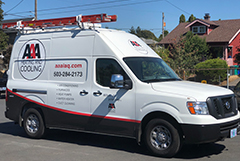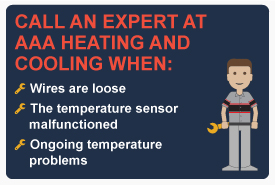Residential Controls Service, Repair & Installation

The Portland area has the good fortune of experiencing all four seasons, including frigid winters and sizzling summers. As temperatures rise and fall, a well-functioning residential thermostat will help keep your home comfortable and energy costs lower. Knowing common thermostat problems will give you insight into when it’s time to call the experts at AAA Heating and Cooling to prevent serious issues with your HVAC system.
Common Residential Thermostat Issues
- Wrong location: Being near a heat source or in direct sunlight can cause a thermostat to think a room is warmer than it is. The best location for a thermostat is in a central location, about five feet off the floor.
- Age: Older thermostats that still use mercury tend to be more inaccurate than new digital models.
- Not enough power: Newer thermostats use battery power. If the batteries are low or the battery recharging system malfunctions, the thermostat may not work properly.
- Programming defects: Thermostats with RAM-like programming chips can lose their programming in a sudden power loss. Newer programmable thermostats have ROM-like memory that keeps devices programmed when there’s a power loss.
Programmable Thermostat Troubleshooting
- The display screen is blank: Remove the cover and replace the batteries. If the batteries are charged, ensure the breaker isn’t tripped or a fuse isn’t blown.
- The temperature in your home never feels right: Verify that the temperature on the thermostat matches the temperature on a digital thermometer. If it’s off by five degrees, follow the directions in the user manual to calibrate the thermostat.
- The house always feels too warm or cold: Ensure the thermostat is on the “Cool” setting during the summer and “Heat” setting during the winter. The set-point temperature should be cooler than room temperature during the summer and warmer during the winter.
- The HVAC system is always running: Set the fan to “Auto,” regardless of the heating or cooling mode.
When to Call an Expert about Residential Thermostat Problems
- Wires are loose, corroded or mis-wired: Attempting to rewire a thermostat on your own can cause problems with the transformer or control board. Because of the risks involved with DIY wiring, it’s best to call a Portland HVAC expert.

- The temperature sensor malfunctioned: If calibrating the thermometer doesn’t work, a specialist can replace it or the entire unit.
- Ongoing temperature problems: If the settings on your thermostat are correct but your home never seems to feel comfortable, there may be an advanced problem with the device or the HVAC system.
Caring for Your Residential Controls
- Keep it clean: Occasionally remove the thermostat’s cover and use a soft brush to remove the dust and prevent incorrect temperature readings and other problems.
- Testing: Every fall, check if the temperature displayed on the thermostat matches the temperature on a digital thermometer. Recalibrate it if necessary.
- Annual HVAC maintenance: During your annual HVAC tune-up, a specialist will ensure your thermostat is clean and alert you to potential problems.
Heating and cooling your home can make up more than 50 percent of your power bill. Having a thermostat that works well can help lower those costs. When your thermostat or zone controls don’t act as expected in your Portland-area home, contact the specialists at AAA Heating and Cooling for expert troubleshooting help. Schedule your appointment today.